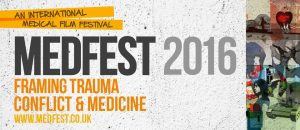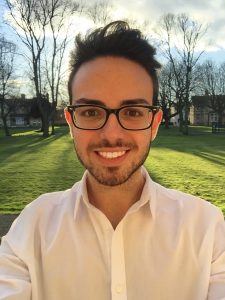This year is the first time that Medfest has ever been hosted by Hull York Medical School. On 21st March, medical students from across all year groups came to the University of Hull to take part in the event, which was organised by the NeuroSoc Committee. Medfest is the UK’s only medical film festival, run by psychiatry trainees and fully funded by the Royal College of Psychiatrists and other sources. It aims to inspire interest in psychiatry and promote the use of film as a medium for understanding the experiences of others. Since its establishment in 2011, Medfest has reached worldwide success. The audience were shown seven short film clips in total, ranging from documentary to drama.
 Audience participation and discussion with a panel of experts is a key feature of Medfest, and our HYMS panel of experts included: Dr Janine Henderson, Psychiatrist and Programme Director of the MB BS at HYMS; Dr Janet Kelly, Lecturer in Healthcare Law and Ethics, who previously worked as a nurse and midwife in the Army for many years; and Dr Arun Kumarapatham, specialist trainee in Liaison Psychiatry. The 2016 theme, ‘Framing Trauma: Conflict & Medicine’, aimed to illustrate the interplay between medicine and war, particularly over the past century, in order to stimulate debate around the role of medicine in a military setting and the wider impact of conflict in human society.
Audience participation and discussion with a panel of experts is a key feature of Medfest, and our HYMS panel of experts included: Dr Janine Henderson, Psychiatrist and Programme Director of the MB BS at HYMS; Dr Janet Kelly, Lecturer in Healthcare Law and Ethics, who previously worked as a nurse and midwife in the Army for many years; and Dr Arun Kumarapatham, specialist trainee in Liaison Psychiatry. The 2016 theme, ‘Framing Trauma: Conflict & Medicine’, aimed to illustrate the interplay between medicine and war, particularly over the past century, in order to stimulate debate around the role of medicine in a military setting and the wider impact of conflict in human society.
Part one: the front line
The first two film clips of the evening focused on the role of doctors in a military setting: an analysis of the difference between physical and psychological involvement of people in war. The first video presented the defined role of a surgeon at the front line of conflict, faced with treating severe physical injury, while the second film involved a soldier working in the engine room who experienced ‘combat fatigue’, a common psychological response to the stress of war. It was interesting to see how the patterns of psychological responses have not changed over the years. The surgeon explains that individuals operate as part of a team in his line of work; however, the soldier who works in the engine room does not believe he is part of a team, nor does he feel entitled to have combat fatigue, simply because he is not fighting at the front line. Therefore, we notice a major difference in terms of feelings and emotions that may arise from different traumatic experiences. We might even argue that this soldier has had more time to reflect upon himself and war, having experienced it in a different context to those on the front line.
Part two: victims and perpetrators
The second two videos considered the way in which trauma impacts upon people’s experience, even though it is extremely difficult to understand what happens in the minds of soldiers once they have returned to society. They are trained to defend their nation, but in doing so must destroy the enemy, and consequently deal with the stress and shock of having taken the life of another human being. Psychological training may offer some preparation but this depends on many factors, and communication plays a key role for families and soldiers dealing with the after effects. Talking therapy and support groups can be helpful for someone who is struggling with difficult memories or suffering with post-traumatic stress disorder (PTSD).
Of course, it is not only soldiers who need support, but also the population as a whole: for example, in Northern Ireland where conflict was a part of daily life during the second half of the last century. One of the clips showed a ‘Theatre of Witnesses’ in Ireland, focusing on voices that have not been heard in society. These are valid witnesses from that period: refugees, survivors and perpetrators. As shown in a clip from the award-winning documentary ‘The Act of Killing’, trauma can be presented through dialogue or constructs exploring the incidents in question, either from the perspective of the perpetrators themselves or the victims of their horrific actions.
Part three: everyday emergency
In the final part of the evening, three short films highlighted the contrast between innovative practices in treatment of psychological trauma and the daily struggles to deliver rudimentary healthcare in conflict zones of the developing world. Nowadays, soldiers are not necessarily sent home when experiencing psychological distress and are often able to stay with their units and carry on with treatment on-site, thanks to specialised medical staff and therapists behind the lines. On the other hand, populations in conflict areas do not have equal access to healthcare, mainly due to lack of money; there are everyday emergencies and their associated costs, such as medicines, treatments, bills, as well as pregnancies. The socio-political and economic climate is what makes the difference between life and death, but these populations are often aided by external organisations, such as Médecins Sans Frontières. From the film clips showing the experiences of civilians in conflict zones, it seems as though women and children are impacted most by war.
Janet Kelly, who sat on the panel of experts, said: “Perhaps the role of women in the armed forces needs greater consideration. How war affects them is often under represented and appreciated. Women tend to be marginalised and forgotten because society incorrectly assumes they don’t serve on the front line when they do; the frontline in not ring fenced and very fluid”.
The evening presented a broad spectrum of videos and documentaries, providing a detailed but not complete picture of this interesting field. What we all took away from this event is that trauma comes in all forms and in any setting. Medfest 2016 has been an invaluable opportunity for reflection, providing insight into trauma and medicine. I would highly recommend a Medfest event to other medical students, as it changes the way you think about medicine and humanity.
 Vassili Crispi is a first year medical student at HYMS with a keen interest in surgery and medical research. In his spare time he likes reading, listening to Anastacia music, playing his sax and clarinet, and travelling.
Vassili Crispi is a first year medical student at HYMS with a keen interest in surgery and medical research. In his spare time he likes reading, listening to Anastacia music, playing his sax and clarinet, and travelling.

